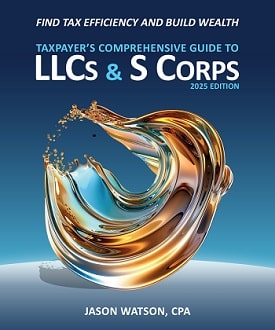Three Types of Income
 By Jason Watson, CPA
By Jason Watson, CPA
Posted Sunday, December 29, 2024
Let’s back up a bit. Our book loves to spill the beans so-to-speak with the net-net fun facts, and then dig a hole under the house for the foundation. Wow. All kinds of metaphors. There are three types of income- earned, portfolio and passive. There is also a small subset of passive income called non-passive income.
Earned Income
Earned income is income that is a direct result of your labor. This income is usually in the form of W-2 wages or as small business income reported on Schedule C of your individual tax return (Form 1040), both subjected to Social Security and Medicare taxes (self-employment taxes). There are other areas such as Schedule E or F where income can come into your individual tax return and be subjected to self-employment taxes, but Schedule C is the most common.
Portfolio Income
Portfolio income is income generated from selling an asset, and if you sell that asset for a higher price than what you paid for it originally, you will have a gain. Depending on the holding period of the asset, and other factors, that gain might be taxed at ordinary income tax rates or capital gains tax rates. Interest and dividends are other examples of portfolio income.
Capital gains are not a form of income per se. Capital gains simply defines how your portfolio income will be taxed. Income is income, and is therefore taxed. This income might be taxed at capital gains rates or ordinary rates. Subtle difference.
Portfolio income is not subjected to self-employment taxes, but as illustrated earlier it might be subjected to net investment income (NII) Medicare surtax.
Passive Income
We touched on this in a previous section. Passive income bluntly is income that would continue to generate if you died. Morbid. How about this? Passive income is income that would continue to generate if you decided to do nothing and sunbathe on some beach. That sounds better. Passive income includes rental income, royalties and income from businesses or investment partnerships / multi-member LLCs where you do not materially participate.
Passive income is also not subjected to self-employment taxes. But similar to portfolio income, it might be subject to the Net Investment Income tax. So, if you own a rental house, the income generated from the rental house is considered passive income although your participation might be considered active. If you take this same rental, and provide short-term rental periods and offer certain services, your income might be considered earned income. Rentals pose all kinds of problems.
Sidebar: Taxpayers used to label themselves as Real Estate Professionals under IRS definition to allow passive losses to be deducted; now we are seeing the same label to avoid Net Investment Income tax on rental income.
Additionally, if you wrote a book and receive royalty checks, that income is also passive and not subjected to self-employment taxes. But, if you write several books or make updates to an existing book (like this one) then you are materially participating in your activity and your income is earned income. And Yes, you would pay self-employment taxes on that income.
Non-Passive Income
But there is another funny thing. K-1 income generated from an S Corp where you materially participate is considered non-passive income. It is not necessarily earned income and it is not passive income. It is something in between, but definitely without the Social Security and Medicare tax element.
As an aside, expatriates, or expats for short, can exclude up to $130,000 (for the 2025 tax year) of earned income while working overseas. Many establish S corporations stateside for their contract gig- both the W-2 and K-1 income up to $130,000 are excluded from income tax.
Therefore, as a shareholder in an S corporation you will receive a K-1. How this income is labeled can change depending on your involvement. Material participation makes your K-1 income non-passive, otherwise it is passive income. As mentioned earlier, this changes the color of money in certain tax applications.
Where is this all leading to? Good question.
More Net Investment Tax, Self-Rentals and S Corps
The Net Investment Income Tax was a topic that was briefly broached earlier. Generally, passive income such as long-term rental income will be considered net investment income and subject to the Medicare surtax. Why do you care? Yes, we ask that a lot.
It is common for a business owner who relies on machinery or equipment to have two business entities. One entity is an LLC that owns the assets. The other entity is an S corporation which leases the assets from the LLC to use in the business. This directly reduces the S Corp’s net operating business income, and might possibly reduce the amount of salary required to be paid by the business to the shareholders. Good news.
Here is an example-
| S Corp Owns Building | LLC Owns Building S Corp Rents from LLC |
|
| Gross Income | 100,000 | 100,000 |
| Rental Expense | 0 | 30,000 |
| Net Income | 100,000 | 70,000 |
| Reasonable Salary (assumed at 40%) | 40,000 | 28,000 |
| Payroll Taxes | 5,640 | 3,948 |
| Savings | 1,692 |
This is an overly simplified example and leaves out depreciation, etc., but you get the idea. In addition, we used a 40% salary calculation simply for the sake of presentation. Your actual salary might be different in your situation. Regardless, the apples to apples comparison shows a nice little savings of $1,692. As mentioned in a previous chapter, the arrangement also allows you to have different partners in each entity allowing you to expand ownership in the operating entity while retaining full ownership in the leased asset (building).
More good news. The LLC’s activities are considered self-rental activities which means that you are creating a transaction with yourself. Provided that this arrangement is at market rates, the IRS accepts this relationship. Moreover, the self-rental income is not considered passive and therefore not subjected to the Net Investment Income Tax calculations.
We know what you are thinking… wait for it… Yes, this changes the color of money (how many times have we said this?).
Here is the code. Treasury Regulations Section 1.469-2 boringly reads-
(f)(6) Property rented to a non-passive activity. An amount of the taxpayer’s gross rental activity income for the taxable year from an item of property equal to the net rental activity income for the year from that item of property is treated as not from a passive activity if the property-
(i) Is rented for use in a trade or business activity (within the meaning of paragraph (e)(2) of this section) in which the taxpayer materially participates (within the meaning of Section 1.469-5T) for the taxable year; and(ii) Is not described in Section 1.469-2T(f)(5).
Read that first paragraph again. Only attorneys and legislators could have taken a simple concept and made it unnecessarily complicated. Let’s summarize. If you have a self-rental situation with a business where you materially participate, that income is not considered passive income.
Self-rental situations are not just limited to buildings. You could lease your car to your S corporation. No, this isn’t the same as leasing a car from a dealership. This is where you own a piece of equipment, let’s say an automobile, and you lease it back to your business for your business’s use. Sounds exotic, but it is quite simple. More about this in a later chapter dedicated to fringe benefits and tax deductions.
This is about the equipment used in your trade or craft. Field engineers and landscapers are just a few that come to mind who benefit from a self-rental situation.
Wait! There’s more. There’s always more.
Interest income generated from loans to the S corporation are also excluded from the Net Investment Income Tax calculations to the extent of your allocable share of non-passive deduction. Huh? Example time.
Jim Smith and Sharon Jones own JS Toys as 60-40 partners. Jim received $1,000 in interest income from the business because he lent the business money. Jim owns 60% of the business. Therefore, Jim can exclude $600 from his net investment income since that is his allocable share of non-passive income. The remaining $400 would be subjected to the Net Investment Income Tax calculation. Yes, we accountants love a stupidly convoluted tax code- keeps you confused or bored, and keeps us employed.
Make sure this stuff is handled correctly. You might be paying a Medicare surtax gratuitously.
Here is a little teaser: you would never want to own real estate in your S corporation, or any appreciating asset for that matter. We’ll explore this in our next chapter.
Income Types Recap
We talked about a lot of things regarding the type of income and how it is treated. Here is a brief recap-
- Earned income is subjected to self-employment taxes for self-employed, or payroll taxes in the form of Social Security and Medicare taxes for the W-2 employee. Easy.
- Portfolio income is generated by selling assets and is taxed at the capital gains rate or ordinary income tax rate depending on how long you owned the asset. Interest and dividends are also considered portfolio income. Also easy.
- Long-term rental income is considered passive income which is taxed at the ordinary income tax rate only (as opposed to being taxed twice, once with self-employment taxes and again with ordinary income taxes). Rental losses are considered passive losses.
- Passive losses can only be deducted from passive income, generally. But there are exceptions, of course.
- Passive losses might be deducted against other forms of income such as earned income, portfolio income and non-passive income up to a $25,000 limit. This requires your participation to be considered active, which is a much easier threshold than material participation. Usually 100 hours will do it.
- The deduction of passive losses with active participation becomes limited when modified adjusted gross incomes exceed $100,000 and are reduced to zero at $150,000. Those disallowed losses are carried forward into the future to be used when incomes or dispositions of assets allow.
- Non-passive income cannot be offset or reduced by passive losses except the magical $25,000 figure. So, if you have $100,000 in passive losses from your rental properties and $100,000 in income generated from your self-rental to your business, your non-passive income can only be reduced to $75,000.
- There are PIGs (Passive Income Generators) which have been under IRS scrutiny as abusive tax shelters since their sole purpose is to generate passive income in the beginning to offset other passive losses.
Tilt. This can be confusing. Please contact WCG CPAs & Advisors for more assistance and hopefully clarification.
Wanna Talk About Your Small Business?
Please use the form below to tell us a little about yourself, and what you have going on with your small business or 1099 contractor gig. WCG CPAs & Advisors are small business CPAs, tax professionals and consultants, and we look forward to talking to you!




